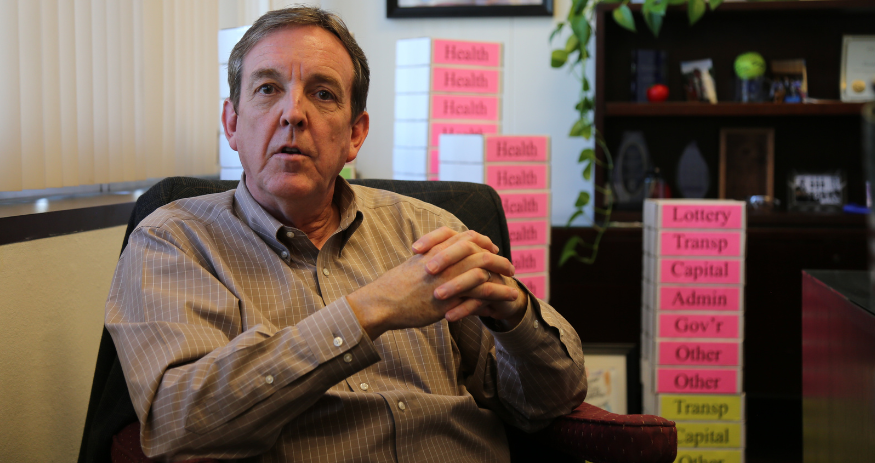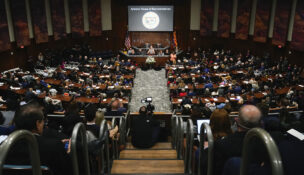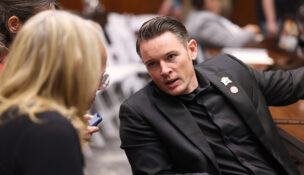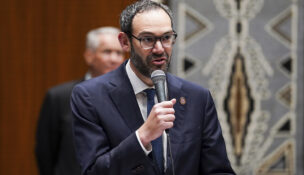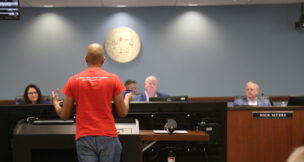Sen. Ken Bennett: Strumming for fun, voting on merits
Hannah Elsmore Arizona Capitol Times//September 20, 2024//
Sen. Ken Bennett: Strumming for fun, voting on merits
Hannah Elsmore Arizona Capitol Times//September 20, 2024//
Sen. Ken Bennett felt guided to politics at a young age and worked his way up from Prescott City Council to the state Senate, where he was president, to the Secretary of State’s Office and back to the Senate. Bennett lost in the Legislative District 1 Republican primary this year, but he may not be done serving the state. In an interview with the Arizona Capitol Times, Bennett shares his experience with what he described as a “civil war going on within the Republican Party.”
The questions and answers have been edited lightly for style and clarity.
What is your most fond memory of your time in public service so far?
Just the people around here. Bonny (Solheim, his assistant), Dan, (a Senate staffer) and just the people in the building, staff. To me, the best thing about this place is building relationships. So, the people are my fondest memories.
Did your staff help you write the sine die song this year?
They helped a little bit with a few verses. There’s a list of the songs that I’ve done. I think we’re up around 70. But we did songs for, you know, the time to pass the budget. There are songs I sang at funerals when lobbyists would die. There were four or five Republicans that were retiring, and so we did a retirement song for each of them. We wrote a song to present the softball trophy to the House. When I first got here, the first year or two, the Senate beat the House in softball, which was a rarity. But then, about three years later or something, they beat us, and so they wanted the trophy to be presented. We weren’t going to do it unless we could do a song. So, we wrote a song and had a lot of fun with that. It’s kind of part of that relationship building thing, some levity and humor. One year, I talked about the governor’s facelift. One of the lines in the song was, “A few thousand bucks will keep the wrinkles away.” She didn’t speak to me for two or three weeks. But anyway, sometimes you can say something in a song that would be hard to say in any other way.
How have your life experiences shaped your approach as a legislator?
As the oldest child in a family with five kids and later two more adopted, I got to be kind of an adult and a peacemaker, and so I have kind of been raised with this idea of just managing the differences between opinions and, you know, trying to get things smoothed out. That’s ended up being a lot of what I’ve done down here.
What do you think of the state of the Republican Party right now?
Well, there’s a civil war going on within the Republican Party, and you can easily be thrown out of one part of the party by people in that area. You can do 99 things right, and then you do one thing that differs from what they think is a true Republican, and all of a sudden you’re a RINO. You know, I was the hero of the audit until the auditor released a report that said, “Hey, we counted the ballots in Maricopa County, and we came up with essentially the same result that the county came up with.” Then because I had the audacity to go around the state and do a couple of town halls at the request of a public relations group that I was kind of working for at the time, because I had the audacity to go around and tell Arizonans that the auditor said he confirmed the results of the Maricopa County Elections Department, and Biden didn’t win Maricopa County by 45,000 when he won by 45,300. Just the fact that I would stand on the stage and state that fact, all of a sudden I went from being the hero to the devil. So, yeah, there’s a disturbing element within the Republican Party. It has no interest in focusing on the 80 or 90 or 95% of the times that we agree. They want to focus on the one or two or 5% of the time that someone disagrees with them, and with that fact alone, you can’t be a good Republican anymore, in their mind.
When did you start to notice this shift within the party?
Well, I’ve noticed it ever since the 2020 (election) when Trump lost. Until then, it seemed like we were willing to accept the results and I don’t have any problem verifying elections to make sure that elections were done right. I expressed huge support and admiration for the Senate to call for an audit of the largest county’s election in a very tight race. I mean, there’s nothing wrong with that. I think, as a country, we’re very divided, and so I started seeing this in the response to the 2020 election.
Are you at all concerned about how people will react to the results of the 2024 election?
Scared to death. Somebody’s gonna lose by a hair again, and we could have violence in this country that makes January 6th look like a tea party.
Why do you think it is important that we can criticize those within our own party?
Because everyone can make a mistake and get a little bit off-kilter, and making sure that we do things that are constitutional has to apply to ourselves, as well as the other party or anyone else. So if I think we’re violating the Constitution, or if I think we’re doing something that hasn’t been well thought through, I’m going to vote on the merits — or lack thereof — of a bill. I think we counted up the Republican-sponsored bills in the Senate. There were over 550, and I voted wrong, in their opinion, on five or six of them. It wasn’t many.
How does it feel to be accused of being a Democrat just for voting on the merits of a bill?
Well, I know I’m not a Democrat. I know I’m not a Republican in name only. In my career, I’ve been a part of championing more Republican principles and actions and budgets. So you work to find compromises that are consistent with your principles, and that is just kind of thrown out the window. You know, they’ll take five or six votes, twist them or exaggerate them into complete lies, and spend half a million dollars lying about you. If I have to tear someone else down to sit in this chair, I’m not interested.
From your perspective, what is most important in leading a committee? How does public comment play a role in that?
Respect, and that can be evidenced in a lot of ways. It was Stephen Covey, I think, who said the biggest problem we have as human beings when trying to interact with each other is that we listen to respond instead of listening to understand. Respecting other people, giving them a chance to express their opinions. You don’t have to let it become a free-for-all where people are shouting at each other. For some legislators, respect is a rare skill as far as how they seem to conduct themselves. It’s important to say, “I hear you and I understand, and maybe there are a few things that we can adjust or keep in mind when we’re writing the details of legislation.” That’s kind of what happened on the border bill (HCR2060). You know, I’m not going to support a bill that tries to apply a new state law 10 years ago to Dreamers. It’s unconstitutional. I wanted to vote for that bill, but we needed to fix some things first. There are some that were so offended by that approach, enough that they sent somebody up, raised him a bunch of money and took me out.
We’re approaching the first general election since 2020, where voter confidence in elections reached a low. As a former secretary of state and the former Senate audit liaison, what needs to be done to increase voter confidence in Arizona’s elections?
Verifying elections, transparency and public verifiability. It’s important for us to verify our elections, which is why I was a “no” vote on the budget this year. Out of the $16 billion we spent, I wanted two and a half million dollars for an election verification project out of money that’s already sitting up in the Treasurer’s Office. The governor ultimately said no, and the legislative leadership couldn’t change her mind. There’s all these people that are beating the drum about election verification: Wendy Rogers, Jake Hoffman, Sonny Borrelli, and so on. If two of them would have said, “No, we’re not going to pass the budget unless we get two and a half million dollars for election verification,” we would have got two and a half million dollars, and we would be able to provide the best verification for the November election that we could possibly imagine.
Does your plan for the future include coming back to state politics?
I’m pretty sure what’s next involves my 10 grandchildren, six of which have been added to our family because of two weddings. So, we’ve had four natural grandchildren, but our son married a beautiful lady with four beautiful children, and then her daughter is marrying a guy with two and so, suddenly, we have 10 grandchildren. And, of course, more time with my wife. I don’t think my public service career is over, but I have nothing planned, as far as specifically running for office. There’s some state agencies I wouldn’t mind being the director of.
Are you eyeing any specific ones?
Well, my good friend Andy Tobin ran the Department of Administration for five or six years for (Doug) Ducey. I wouldn’t mind that. I like the lady that’s over there now, but she can’t get through Jake Hoffman’s committee. If I went for it, that would be an interesting hearing.

